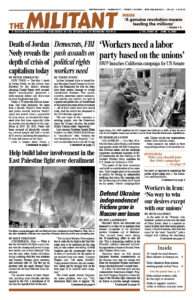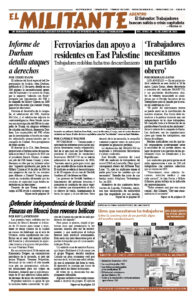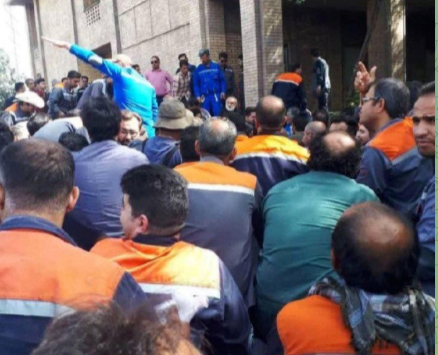In the wake of the “Women, Life, Freedom” protests in Iran over the death of Zhina Amini, there is a marked increase in labor and other social protests. Amini, a Kurdish woman, died after her arrest by the hated “morality” police, charged with violating the reactionary government’s dress code.
The Shiite-based bourgeois-clerical regime has offered concessions in some cases and arrests and repression in others to try to tamp down workers, youth and oppressed nationalities. On the eve of a May 22 nationwide strike by truck owner-operators, the government announced a 30% increase in freight rates. Truckers in Arak, Bandar Abbas, Isfahan and Bandar Khomeini went on strike for several days.
“Although we did not reach all our demands, we were able to make our words and demands heard by everyone,” the Union of Truckers and Drivers Organizations said May 27, announcing the end of the strike. “The authorities gave in out of fear of the drivers.”
But the regime has taken a heavy-handed approach to thousands of oil project contract workers — including welders, pipefitters and scaffolders — who have held over 70 rallies or strikes over the last year. They work jobs that might last only three or four months and can face layoffs of six months at a stretch.
“The workers say they are discriminated against even in water,” reported the Iranian Labour News Agency, affiliated to the government-allied Workers’ House. “Officials and contract bosses receive mineral water, but the workers themselves are given unsanitary water from tankers,” the agency said. Workers also complain that deductions from their salary were made for food but all they got “was simple potatoes or eggs.”
Oil project workers on strike
Thousands began a strike April 15, which rapidly spread to over 100 work sites. They are demanding a 79% wage increase — with inflation now running over 50% — and a more humane work schedule of 20 days followed by 10 days off instead of the more debilitating 24 days in a row with six days off.
“If we can fulfill these two urgent demands with the power of unity, we will have more power to continue our struggle to dismantle the contractor system,” the Organizing Council of Oil Contract Workers said. The union wants to get rid of the exploitative middlemen and be employed directly by the oil companies, taking a step to overcome one of many divisions employers foster.
After the governor of Bushehr province announced a crackdown May 14, the Iranian Labour News Agency ran an article headlined “Protest against the arrest of eight South Pars workers. Hear the voice of the contract workers.”
A week later the Islamic Revolutionary Guard Corps, the regime’s main repressive force, said it had arrested “the main leader of the strikes, who has been leading the disturbances since 2019.” Since then there has been no news on whether or not the strike continues.
The faction-ridden capitalist government in Tehran is trying to roll back the belief by millions in Iran that the wearing of a hijab or not should be a woman’s personal choice.
The parliament is debating a bill requiring police to send text messages to women violating the dress code. Repeat “offenders” would face ever increasing fines and eventually the possibility of jail time. Some in the government claim the proposed bill is too “lenient.”
Daily protests, across Iran
None of this has stopped workers from taking to the streets. Almost every day there are new rallies or strikes by rail workers, nurses, steelworkers, municipal workers, miners and others over unpaid wages and poor working conditions or for higher wages. For months retirees have held weekly and at times daily protests demanding an increase in pensions.
Mozhgan Baheri, a teachers union activist in Fars province, was recently released from prison. He wrote that “the sentence ‘we turn prisons into universities’ should be written in gold,” referring to what union and political prisoners have been learning behind bars.
“We do not believe in any other way to achieve our desires except trade union activity,” he said. “We have chosen our way, the government must also choose.”


